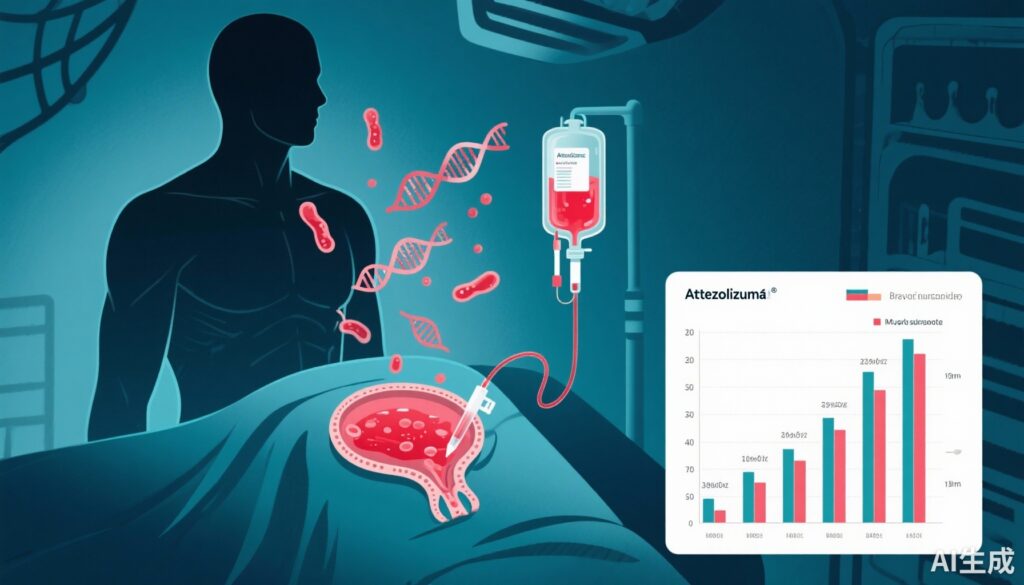Highlights
- ctDNA detection post-cystectomy identifies muscle-invasive bladder cancer patients at high risk of recurrence and candidates for adjuvant immunotherapy.
- The phase 3 IMvigor011 trial demonstrated that ctDNA-guided adjuvant atezolizumab significantly prolongs disease-free survival and overall survival versus placebo.
- Persistent ctDNA-negative patients exhibited excellent prognosis with surveillance alone, highlighting the utility of ctDNA for treatment individualization and sparing unnecessary therapy.
- Adverse events were manageable, though grade 3-4 toxicities and rare fatal events underscore the importance of patient monitoring.
Background
Muscle-invasive bladder cancer (MIBC) represents a clinically aggressive subset of urothelial carcinoma, characterized by invasion of the muscularis propria with high likelihood of systemic relapse after radical cystectomy. Despite multimodal approaches including neoadjuvant cisplatin-based chemotherapy, relapse rates remain approximately 50% within two years post-surgery, and 5-year overall survival lingers at 50-60%.
Consequently, there is an urgent need for biomarkers to stratify patients by recurrence risk and guide adjuvant therapeutic interventions to improve outcomes without overtreating low-risk individuals. Circulating tumor DNA (ctDNA), representing tumor-derived fragmented DNA detectable in plasma, has emerged as a minimally invasive biomarker for molecular residual disease (MRD). Serial ctDNA assays allow dynamic monitoring for residual cancer cells undetectable by conventional imaging, thereby potentially enabling earlier intervention.
Immune checkpoint inhibitors, specifically anti-PD-L1 antibodies such as atezolizumab, have shown efficacy in advanced urothelial carcinoma. However, adjuvant immunotherapy post-cystectomy has shown mixed results, perhaps due to lack of biomarker-driven patient selection. Integrating ctDNA-guided approaches may identify patients with MRD who are most likely to benefit from adjuvant immune modulation, optimizing therapeutic index and long-term survival.
Key Content
Chronological Development of Evidence
Development of ctDNA assays as a biomarker for bladder cancer MRD has evolved over recent years with increasing sensitivity and specificity. Early-phase studies indicated that ctDNA positivity post-surgery correlates with imminent relapse and poor prognosis. These findings set the stage for prospective clinical trials to evaluate the clinical utility of ctDNA-directed adjuvant therapy.
The IMvigor011 trial (NCT04660344) represents a landmark phase 3, double-blind, randomized controlled trial designed to test whether atezolizumab improves outcomes in ctDNA-positive MIBC patients post-cystectomy. This global study enrolled 761 patients without radiographic disease evidence after surgery, utilizing serial ctDNA testing over one year. Those persistently ctDNA-negative underwent surveillance only, while ctDNA-positive patients were randomized 2:1 to receive atezolizumab or placebo every 4 weeks for up to one year.
Randomized Controlled Trial Details and Outcomes
Among 250 ctDNA-positive patients randomized (167 atezolizumab, 83 placebo), median disease-free survival (DFS) extended significantly with atezolizumab (9.9 months) compared to placebo (4.8 months), yielding a hazard ratio (HR) for recurrence or death of 0.64 (95% CI, 0.47-0.87; P = 0.005). This represented a meaningful improvement in delaying disease recurrence.
Overall survival (OS) was a key secondary endpoint, assessed hierarchically to control type I error, and demonstrated significant benefit favoring atezolizumab with median OS of 32.8 vs. 21.1 months for placebo (HR for death 0.59; 95% CI, 0.39-0.90; P = 0.01).
Notably, among 357 patients who persistently tested ctDNA-negative and thus did not receive adjuvant treatment, DFS was remarkably high—95% at 1 year and 88% at 2 years—validating ctDNA negativity as a strong prognostic indicator and underscoring the potential to spare low-risk patients from unnecessary immunotherapy exposure.
Safety and Adverse Events
Grade 3 or 4 adverse events occurred in 28% of the atezolizumab group versus 22% in placebo (treatment-related in 7% vs. 4%). Fatal adverse events were infrequent but more in the atezolizumab group (3% vs. 2% overall; treatment-related 2% vs. none). These safety outcomes align with known profiles of PD-L1 inhibitors but necessitate vigilant monitoring when deployed in the adjuvant setting.
Expert Commentary
IMvigor011 provides compelling evidence supporting a precision medicine approach exploiting ctDNA as a biomarker to tailor adjuvant immunotherapy in MIBC. By identifying molecular residual disease, clinicians can identify patients likely to experience relapse and benefit from atezolizumab, a strategy that addresses the heterogeneity of recurrence risk.
The marked difference in DFS and OS between the ctDNA-positive cohorts receiving atezolizumab vs. placebo underlines the validity of this approach, overcoming the nonselective administration limitations encountered in prior adjuvant immunotherapy trials. Additionally, the exceptional outcomes in ctDNA-negative patients highlight the prognostic power of ctDNA clearance, potentially minimizing overtreatment.
From a mechanistic standpoint, ctDNA may reflect minimal tumor burden allowing immune checkpoint blockade to eradicate residual malignant clones before radiographically detectable disease emerges. This early preemptive immunotherapy could transform the natural history of MIBC.
However, some limitations persist including the relatively modest median DFS in treated patients and potential toxicity concerns. The hazard ratios, though statistically significant, indicate the need for further optimization and combination strategies. Moreover, implementation of ctDNA testing in routine practice requires standardization, cost-effectiveness assessment, and accessibility improvements.
Ongoing discussions about timing and duration of adjuvant atezolizumab, integration with neoadjuvant therapies, and expansion to other urothelial cancer subtypes will refine treatment algorithms. Future research should also explore other immunomodulatory agents and novel biomarkers to enhance patient selection.
Conclusion
The IMvigor011 trial establishes ctDNA-guided adjuvant atezolizumab as a new paradigm in managing muscle-invasive bladder cancer post-cystectomy, delivering significant improvements in disease-free and overall survival in ctDNA-positive patients. Using ctDNA to identify molecular residual disease represents a vital step toward personalized oncology, sparing low-risk patients from unnecessary immunotherapy and its associated toxicities.
As precision medicine advances, integrating molecular biomarkers like ctDNA with immunotherapeutics is poised to improve clinical outcomes, reduce treatment burden, and optimize resource utilization in MIBC. These findings warrant incorporation into clinical guidelines and support expanded clinical use of ctDNA testing to guide adjuvant immunotherapy.
Future studies should focus on validating real-world applicability, refining assay technologies, and developing combination regimens to augment antitumor immunity and durability of response.
References
- Powles T, Kann AG, Castellano D, et al; IMvigor011 Investigators. ctDNA-Guided Adjuvant Atezolizumab in Muscle-Invasive Bladder Cancer. N Engl J Med. 2025 Oct 20. doi:10.1056/NEJMoa2511885. PMID: 41124204.
- Kann AG, Gross-Goupil M, Nishiyama H, et al. IMvigor011: a study of adjuvant atezolizumab in patients with high-risk MIBC who are ctDNA+ post-surgery. Future Oncol. 2023 Mar;19(7):509-515. doi:10.2217/fon-2022-0868. PMID: 37082935.



